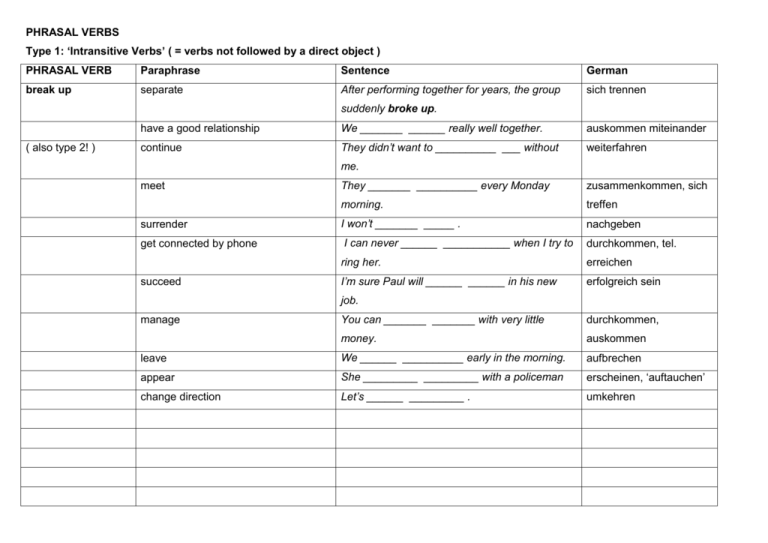
A list of phrasal verbs free#
Phrasal verbs are differentiated from other classifications of multi-word verbs and free combinations by criteria based on idiomaticity, replacement by a single-word verb, wh-question formation and particle movement. Additional alternative terms for phrasal verb are compound verb, verb-adverb combination, verb-particle construction, two-part word/verb or three-part word/verb (depending on the number of particles) and multi-word verb. Phrasal verbs that include a preposition are known as prepositional verbs and phrasal verbs that include a particle are also known as particle verbs. In other words, the meaning is non- compositional and thus unpredictable. These semantic units cannot be understood based upon the meanings of the individual parts alone, but must be taken as a whole. There are tens of thousands of them, and they are in everyday, constant use. Choose the right word or the right word form if it is the same word.In English traditional grammar, a phrasal verb is the combination of two or three words from different grammatical categories – a verb and a particle, such as an adverb or a preposition – to form a single semantic unit on a lexical or syntactic level. In this phrasal verb quiz, you have three choices to fill the gap. I used to collect them when I was younger. Not anymore, but the other day I was cleaning up my room when I came across an old album of football stickers. I fell out with one guy who lived there because he played his music too loud, but he has moved out now. There are several of us in the house so it is crowded, but we get along well so we have not had any serious problems. I found out recently that my father has cancer, and he smoked a lot when he was younger. I’ve read that both of those are unhealthy. I would also like to cut out red meat from my diet. Something I definitely need to do is cut down on the amount I smoke, or even give it up completely. Unfortunately I don’t get the chance to catch up with them often as we are all so busy with work.

The aim of these pages is to show you how they can be used in an ‘ IELTS context’ so the words have been placed in answers to IELTS type questions.Īfter every 10 words there are phrasal verb exercises to test your knowledge of the words.īut to emphasize again, the words can change according to tense and context, so as you learn them do some internet research on each one to see how it can vary. If you learn some phrases and try to ‘fit’ them into your speaking or writing to get a higher score without knowing them properly, it may sound unnatural and you may make mistakes, which will be noticed by the examiner. That said, as with any new vocabulary, you have to be careful with the way you learn them. You also want to be able to recognise them if someone else uses them in their writing or speaking otherwise you may misunderstand what they are saying. They can be used in writing in some cases and in spoken language. They can be important for IELTS as someone who can use them naturally shows that they have a good command of the English language. = Become loose and unattached (usually hair or teeth) Phrasal Verbs and IELTS I think I'm going to break up with my girlfriend (= future)Īnd also some have more than one meaning: I 've broken up with my girlfriend (= present perfect) I hope my girlfriend does not break up with me (= present) I broke up with my girlfriend last week (= past) Look at this example with ' break up' (= to end a relationship): Some phrasal verbs must take an object, and some can be put either side of the object.įor example, look at this illustration with the phrasal verb ‘ let down’ (= disappointed):Īnother difficulty is that they are verbs, which obviously means they take a tense and will change according to whether it is past, present or future. To “put up with" = to accept someone or something unpleasant in a patient way Difficulties However, when these words are put together, the meaning completely changes. You probably know that the word ‘ put’ means to place something somewhere, such as “I put the book on the table”, and the word ‘ up’ means to in or towards a higher position. When these two words are put together, they have a different meaning to what each word means on its own.

A list of phrasal verbs plus#
Phrasal verbs are verbs plus a preposition or an adverb (or followed by two).


 0 kommentar(er)
0 kommentar(er)
